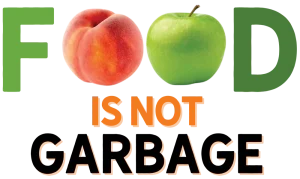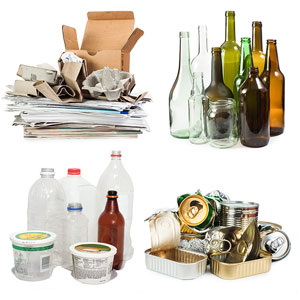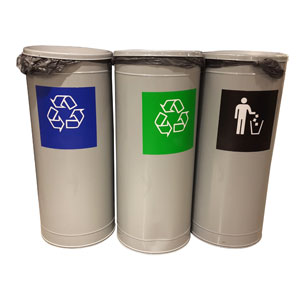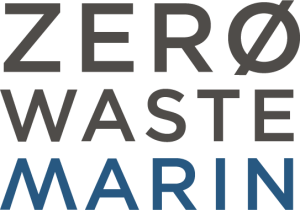
There are a few important laws related to recycling and waste management in California that you should know about. These California recycling laws are aimed at helping the state reach its diversion goals and to keep resources out of the landfill.
For residents, the Short-lived Climate Pollutants Law (SB 1383) is really the only one you should be aware of, the rest pertain to businesses or multifamily dwellings.
Our dependence on fossil fuels, industrial agriculture, and the immense amount of waste produced by our modern lifestyles has resulted in a climate crises: hotter summers with world record-breaking temperatures, even more devastating fire seasons, more extreme droughts, and rising sea levels that erode our coastlines.
When organic materials like food scraps and yard waste are landfilled, they break down anaerobically (without oxygen). This creates methane, a greenhouse gas 84 times more potent than carbon dioxide (CO2). According to CalRecycle, landfills are the third largest source of methane emissions in California.
To respond to this climate crisis, California has implemented SB 1383, statewide organic waste recycling and surplus food recovery.
All residents must sort recyclable and compostable materials into the appropriate containers and those with landfill collection service must also subscribe to and utilize recycling and compost service.
Subscribe to and participate in compostables service.
Marin Sanitary Service offers a residential bundled service package with weekly curbside collection of compostables (organics), recycling, and garbage service.
For more information about SB 1383, visit California’s Short-Lived Climate Reduction Strategy page on California’s Department of Resources Recycling and Recovery (CalRecycle) website.
 “Save The Food’ is a public service campaign by the Natural Resources Defense Council (NRDC) designed to help consumers reduce food waste. Learn how simple lifestyle changes can significantly reduce the over 20 pounds per month of food individuals throw away.
“Save The Food’ is a public service campaign by the Natural Resources Defense Council (NRDC) designed to help consumers reduce food waste. Learn how simple lifestyle changes can significantly reduce the over 20 pounds per month of food individuals throw away.
Subscribe to and participate in compostables service.
Marin Sanitary Service offers multifamily compostables (organics), recycling, and garbage service.
For more information about SB 1383, visit California’s Short-Lived Climate Reduction Strategy page on California’s Department of Resources Recycling and Recovery (CalRecycle) website.
We can help you be in compliance! Our recycling coordinators can do site visits and audits, supply educational materials, and provide ongoing technical assistance.
Get posters to properly label your carts and bins.
Subscribe to and participate in compostables and/or Food 2 Energy service.
Marin Sanitary Service offer commercial compostables (organics) service. We also offer a Commercial Food 2 Energy food-waste-only service for qualifying customers.
Certain commercial food generators must donate surplus edible food to comply with SB 1383 regulations.
In Marin County, there are two Food Recovery Organizations (FROs): ExtraFood.org and the SF-Marin Food Bank.
To learn more about these requirements and to determine whether your business qualifies as a Tier 1 or Tier 2 generator, visit the Zero Waste Marin website.
For more information about SB 1383, visit California’s Short-Lived Climate Reduction Strategy page on California’s Department of Resources Recycling and Recovery (CalRecycle) website.
In 2012, California adopted AB 341 the Mandatory Commercial Recycling Measure to enhance systems that capture recyclable materials from the commercial sector.
The purpose of the law is to reduce greenhouse gas emissions by diverting commercial solid waste from landfills and expand opportunities for recycling in California.

Complexes of five (5) or more units must recycle.
Subscribe to and participate in recycling service.
Marin Sanitary Service offers recycling service for multifamily properties.
We can help you be in compliance! Our recycling coordinators can do site visits and audits, supply educational materials, and provide ongoing technical assistance.
Subscribe to and participate in recycling service.
Marin Sanitary Service offers recycling service for commercial businesses.
We can help you be in compliance! Our recycling coordinators can do site visits and audits, supply educational materials, and provide ongoing technical assistance.
The state of California has passed several laws related to the disposal of commercial waste in our state. This is because our recyclables are made of valuable natural resources, and by recycling we can conserve those resources and prevent greenhouse gas emissions. Separating our waste helps preserve our natural environment and prevent climate change.

Businesses subject to AB 341 and AB 1826 must provide bins to customers for collecting organics and recycling alongside trash bins.
We can help you be in compliance! Our recycling coordinators can do site visits and audits, supply educational materials, and provide ongoing technical assistance.
